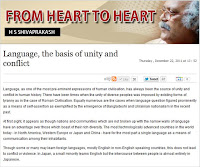[MLE] Language, the basis of unity and conflict

Dear MLE friends, A while ago I travelled with a donor to review an MLE related project in North East India. Her concern was that our efforts to develop the local languages and use them in the schools would encourage the ethnic conflicts. Today I saw an IBN article titled " Language, the basis of unity and conflict " by Prof H S Shivaprakash on this very issue. A few quotes: Language, as one of the most pre-eminent expressions of human civilisation, has always been the source of unity and conflict in human history. There have been times when the unity of diverse peoples was imposed by existing forms of tyranny as in the case of Roman Civilisation. Equally numerous are the cases when language question figured prominently as a means of self-assertion as exemplified by the emergence of Bangladeshi and Ukrainian nationalism in the recent past. India never had the counterp...
